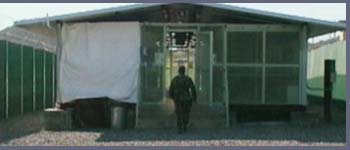 |
 |  |  |  |  |  |  |
 | |     |

 |  |
|  | |
| Abdurahman Khadr's story provides a rare glimpse inside the U.S. Naval base at Guantanamo Bay, Cuba, or "Gitmo," where more than 600 enemy combatants are being detained and interrogated. Here, are several other detailed accounts from others who have been inside Guantanamo.
| |  |
 |  | Guantanamo Bay on Trial |  | |
| |
Vanity Fair contributing editor David Rose visited Guantanamo for this article and he describes daily life for both the detainees and the Americans working there. He discovers that "instead of the trauma wrought by combat, the Guantanamo medics now spend their time treating wounds of the psychological variety…" and writes "Talking to senior figures inside the U.S. intelligence community, the Pentagon, and its specialist cadre of military lawyers, I encountered unease about nearly every aspect of Gitmo." [Vanity Fair, January 2004]
| |
 |
 |  | People the Law Forgot |  | |
| |
According to James Meek, "The question, 'What is Guantanamo really like?', has all the appeal of the unknown. But inside it lurks a darker question, with all the implications for freedom in America and beyond that its answer contains: 'What is Guantanamo?'" He attempts to answer this question by examining interviews with former detainees and guards, information from censored prison mail, and official statements. [The Guardian, Dec. 3, 2003]
| |
 |
 |  | How We Survived Jail Hell |  | |
| |
Here, three British citizens released in March 2004 recount their journey to Cuba and their experiences in Camps X-Ray and Delta. "All are convinced that there are no 'big-time' terrorists at Guantanamo: arguably the most dangerous, in American eyes, says Ahmed, is a group of Taliban mullahs," writes David Rose. [The Observer, March 14, 2004]
| |
 |
 |  | Cuba? It Was Great, Say Boys Freed From US Prison Camp |  | |
| |
Guardian reporter James Astill interviews three juvenile prisoners who were released from Guantanamo in January 2004 and finds that the boys' account is quite different from "the prevailing opinion … among most human rights groups." The boys describe their lessons, which included English, Arabic, math, science, art and Islam. They also say the food was delicious, and they were allowed to watch movies, and play sports. [The Guardian, March 6, 2004]
| |
 |
 |  | Detainees at Base in Cuba Yield Little Valuable Information |  | |
| |
This October 2002 Washington Post story depicts Guantanamo as "losing its usefulness as a place for gathering valuable intelligence information," as compared to other holding centers for Al Qaeda detainees, such as the U.S. military base in Bagram, Afghanistan. However, among the Guantanamo prisoners who were providing useful information, is Omar Khadr, according to unnamed U.S. officials quoted in the story. [Washington Post, Oct. 22, 2002]
| |
 |
 |  | Many Held at Guantanamo Not Likely Terrorists |  | |
| |
The Los Angeles Times reported in December 2002 that according to military sources, many detainees held at the Guantanamo camp "have no meaningful connection to Al Qaeda or the Taliban, and were sent to the maximum-security facility over the objections of intelligence officers in Afghanistan who had recommended them for release…" Greg Miller also reports that nearly 10 percent of the prison population had been "deemed to be of no intelligence value after repeated interrogations in Afghanistan." [Los Angeles Times, Dec. 22, 2002]
| |
 |
|
home · introduction · interviews · inside the khadr family · · readings · correspondent's notebook
discussion · correspondent's chat · press reaction · tapes & transcripts · credits
privacy policy · FRONTLINE home · wgbh · pbsi
posted april 22, 2004
FRONTLINE is a registered trademark of wgbh educational foundation.
photo copyright © peter jones/corbis
web site copyright WGBH educational foundation
|
|